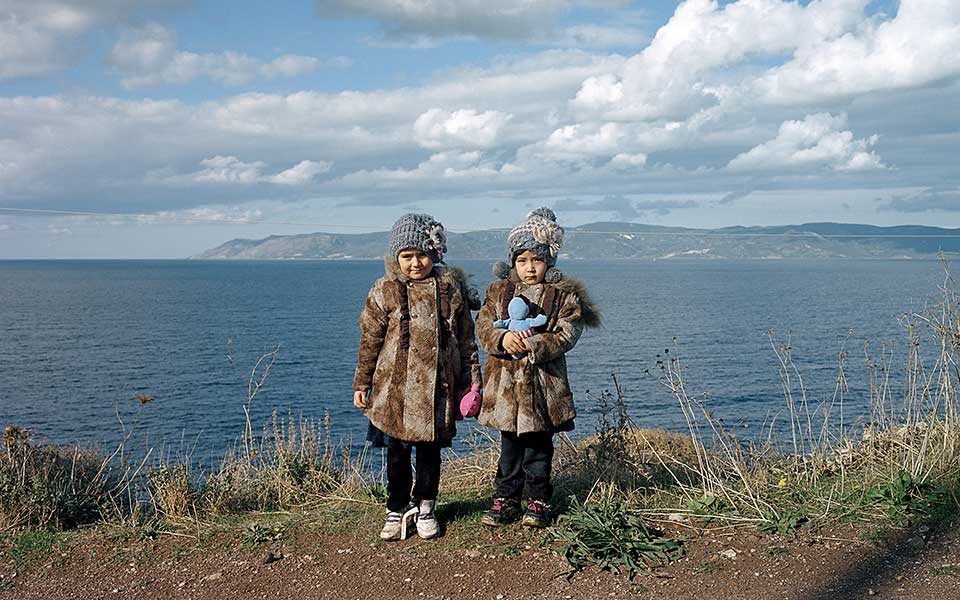The House That Holds the Stories of a...
On a quiet slope of northern...

Moved by the thousands of refugees crossing over from Turkey to the Greek islands, photographer Eirini Vourloumis undertook a project titled “The Mermaid Madonna,” after a book by the acclaimed Lesvos-born author Stratis Myrivilis. The photos accompanying this article are from that project. eiriniphoto.com
© Eirini Vourloumis
From its earliest beginnings, Greek poetry has treated foreigners or outsiders honorably and with respect – even those from lands at war with the Greeks, as we see in the ancient word themixenos, meaning “acting justly towards strangers,” which we owe to Pindar, and the word xenotimos, indicating “one who honors his guests.”
Greek poetry showed respect both to a stranger’s pain and to his bravery. In the Homeric epics, valor and the deep bitterness of war and death are common to all, regardless of tribe or race. And it’s not insignificant that the patriotic words “Fight for your country – that is the best, the only omen!” are spoken in “The Iliad” by Hector, a warrior fighting against the Greeks, a fact we often forget or fail to mention nowadays when quoting them.
With a rich inheritance from the Homeric epics, the high art of Classical Greek tragedy, with its comprehensiveness and perspicacity, couldn’t help but show the foreigner’s pain – even that of the foreigner who fought against Greeks on the battleground, either in myth or in history. Aeschylus’ “The Persians” and Euripides’ “The Trojan Women” offer timeless examples in the way they honor foreign pain. The same is true of Aeschylus’ “The Suppliants”, in which 50 Danaides, who escaped from Egypt to avoid unholy incestuous marriages with their cousins, are welcomed by the city of Argos according to the will of the god Zeus Xenios, who oversees the trials of refugees and migrants. “But yet the wrath of Zeus, the suppliants’ lord, / I needs must fear: most awful unto man / The terror of his anger,” says King Pelasgus of Argos.
The ancient Greeks created their twelve gods in their own image: they shaped them in accordance with values and beliefs they considered incontrovertible, and which they had codified as legal, inalienable rights. These beliefs became the basis for the institutionalized role of the xenofylakas, the nobleman tasked with the protection of foreigners.
From the outset, the foreigner was also, of course, protected by language itself: the word xenos, or “foreigner,” which had a particular weight, was wisely endowed by poets, philosophers and by the customs of the city with a duality of meaning that offered the word an enviable richness, since it referred both to host and guest. In encapsulating this social experience, this word looked ahead to see that the host would likely at some point find himself in the place of need which the guest currently inhabits. It warned him, in other words, to honor these obligations so that he himself, in his own moment of need, would have the right to demand that they be honored for him as well; that others welcome him, as is suitable in human societies – or else be judged to be little better than the Cyclops, as described in Homer’s “Odyssey” and by Euripides in his satyr play “Cyclops.”

Moved by the thousands of refugees crossing over from Turkey to the Greek islands, photographer Eirini Vourloumis undertook a project titled “The Mermaid Madonna,” after a book by the acclaimed Lesvos-born author Stratis Myrivilis. The photos accompanying this article are from that project. eiriniphoto.com
© Eirini Vourloumis
However, while the word xenos in Homer (and in the ancient Greek literature that fed off his rich table) is used to indicate any wanderer or refugee in need of the comforts of hospitality, for the Romans “the original name for a stranger (hostis) came to mean enemy” (Henry Liddell and Robert Scott, “A Greek-English Lexicon”).
In contrast to this usage, the word xenos appears to have particular foresight in later forms of Greek as well. Likewise embodying a social experience, it often ends up identifying the foreigner with the beleaguered, and indeed with someone in distress who is worthy of compassion. According to Emmanuel Kriaras’ “Dictionary of the Medieval Greek Demotic Language, 1100-1169,” the xenos in Byzantine years is, as is true in our more modern era, the migrant, the persecuted, the exiled, the refugee, as well as the unhappy, the careworn and the one who has lost everything. In addition, Kriaras notes, xenos as “the adjective of Christian philanthropy is usually associated with the adjective ‘poor’: ‘always help the stranger and have pity on the poor.’” This line is from the poem “On Exile,” which was written in 15-syllable lines during the 15th or 16th century by an unknown author.
While Zeus was invoked in order to enforce certain behaviors in ancient times, our anonymous post-Byzantine Christian poet calls on God, who “created the world for strangers, too.” Moreover, in order to give examples to his readers, he reminds them that Christ himself took human form as a stranger and experienced all the torments a stranger often endures: “I’ll truthfully tell this truthful thing: / Even the Maker of All Things, the creator of all, / He, too, became a stranger and appeared in the world / and he first of all experienced the bitterness expressed towards strangers, / the sadness and torments.”
The unknown poet must certainly have been influenced by the highly poetic encomium to hospitality composed in the 13th century by the Byzantine Georgios Akropolitis. This encomium is what we hear each Good Friday, after the procession of the Epitaphios, as put to music in the 17th century by Germanos of Patras. Its refrain, “Give me this stranger,” refers to God as a stranger, as Christ, who embraced “strangers and the poor,” a discourse of supplication that shapes the face of the human stranger.
In Greek folk songs about exile created by women, the foreigner is the Greek who leaves his homeland, which has been enslaved by Turks, in order to make his way to some other place in the West or East, in Frankish or Slavic lands. His life far from his people is described as full of torments and traps, which is why the songs advise him always to wear black. Precisely because of this knowledge and bitter experience, one of the most beautiful and popular of the folk songs, “Amarantos,” supports the obligation of hospitality even when you have nothing to offer but your poverty and love. Mother and daughter find a bedraggled, wounded stranger up on the mountain. The mother hesitates to bring him to their poor home, but the daughter insists: “Mother, let’s take this stranger / into our home.” “But we don’t have bread to eat, what will we do with him?” “Mother, my bread is plenty for me to share.”
Greek folk songs as a genre are not naïve. Full of history and social experience, they know that human behavior is often not determined either by the fear of God nor by pure feelings nor by the law, but by prejudice, including bigotry. The song of the “Little Refugee Girl,” with its extremely harsh imagery, comprises a continuation or variation of the “Song of the Bulgarian Girl” or “Orphan Girl,” and was sung by the Greek refugees from Turkey who arrived in Greece after the 1922 Asia Minor Catastrophe.
They may have been Greek, yet, as we know from the writings of George Seferis, himself from Asia Minor, they didn’t find in Greece the hospitable kindness their trials and tribulations had earned them. The folk song, meanwhile, uses harsh images to describe the unwelcoming attitude of the motherland: A mother doesn’t want her son to marry a young refugee. And because he insists, trusting to his love, his mother welcomes the young woman by cooking a soup of snakes. Her son’s beloved eats it, is poisoned, and dies. This single folk song is enough to clear up any delusions that “Greek hospitality runs in our blood.”
This article was originally published in the print magazine Greece Is Philoxenia 2019-2020. To browse or download a digital copy of the magazine click here. Hard copies can also be ordered from anywhere in the world via our e-shop at only the cost of postage and packaging.
On a quiet slope of northern...
Ten must-do experiences in Athens, from...
A Polish-born artist who lives on...
A journey through Hania’s Venetian past,...